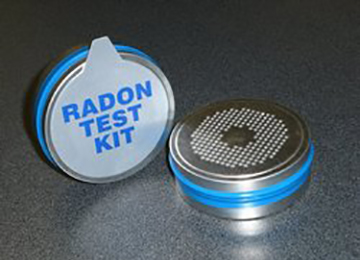Radon is a naturally-occurring radioactive gas that comes from the breakdown of uranium in soil, rock, and water. Radon typically moves up through the ground and can enter structures through cracks or other holes in the building’s foundation. Radon can also enter your home through well water. Unfortunately, once radon gets into a structure, it can become trapped inside, thus exposing the occupants to the negative effects of this odorless, colorless gas.
When you breathe air that contains radon, your risk of lung cancer increases. Radon is the #1 cause of lung cancer in non-smokers and is overall the 2nd leading cause of lung cancer in the United States. “Oh, great,” you may be thinking. “Maybe I don’t want to know. The air is the air – what can be done?”
There is a simple solution – Test. Radon screening to determine radon levels in a home or structure can determine if repairs or mitigation is needed to reduce radon exposures. The first step is to test and determine what your actual radon level is. The EPA recommends testing all homes below the third floor.
Radon mitigation specialists can often assist with reducing radon levels in homes. Sealing cracks and openings in the foundation is just a first step. For a more comprehensive approach, a sub-slap depressurization system that uses vent pipe(s) and fan(s) typically don’t require any major changes to your home. Similar systems can be installed in homes with crawl spaces. Having the right system depends on other factors, including your home’s design. Once a system is selected and installed, you should have your home tested for radon levels again to ensure that the system is to its best capacity. The EPA also references several engineering controls and methods in Reducing Radon in New Construction for developers, https://www.epa.gov/radon/radon-resources-builders-and-contractors
You can obtain a free radon test kit for your home by contacting your local or state radon program:
Virginia Department of Health Radiological Health:
http://www.vdh.virginia.gov/radiological-health/indoor-radon-program/testing/
Montgomery County, MD Department of Environmental Protection:
https://www.montgomerycountymd.gov/green/air/Radon.html
EPA – Radon
For more information about radon testing and proper techniques to reduce radon levels, contact ECS Senior Environmental Project Manager, Beverly Sedon.

